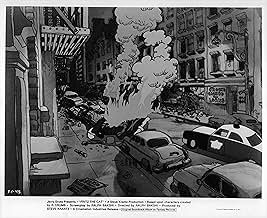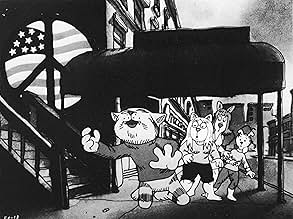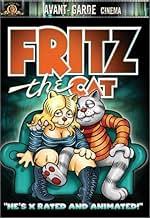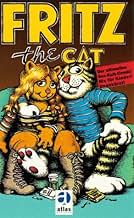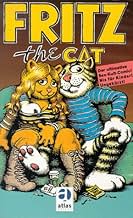VALUTAZIONE IMDb
6,2/10
15.509
LA TUA VALUTAZIONE
Un gatto studente universitario scatena l'inferno in una versione satirica con diversi elementi degli anni '60.Un gatto studente universitario scatena l'inferno in una versione satirica con diversi elementi degli anni '60.Un gatto studente universitario scatena l'inferno in una versione satirica con diversi elementi degli anni '60.
Rosetta LeNoire
- Bertha
- (voce)
- …
John McCurry
- Blue
- (voce)
- …
Judy Engles
- Winston Schwartz
- (voce)
- …
Phil Seuling
- Pig Cop #2
- (voce)
Ralph Bakshi
- Narrator
- (voce)
- (non citato nei titoli originali)
- …
Charles Spidar
- Bar Patron
- (voce)
- (non citato nei titoli originali)
- …
Recensioni in evidenza
The bad thing about the past is that it is designed to fool you.
The idea is supposed to be that the past stays fixed, as a sort of "truth." And we change. But viewed from ourselves, often the illusion or even the truth is the reverse. We know who we are. We think we recall who we were -- which we envision is some state on the way to who we are. Something relatively static, which means that the past changes. Radically.
Or at least artifacts from the past change, artifacts like movies. All this is complicated by the fact that movies are a key tool we use to define ourselves.
So it is a strange trip indeed to encounter something that DID define us, that we allowed to tell us who we were. And to find it so vacuous, so superficial it shocks.
If you were not a hippie in that era you may need to know the great schisms at work. (I mean the era depicted here -- 1969 -- not the actual date of the movie.)
You had the east coast hippies who were the sons and daughters of the beat generation. We were interested in ideas and art, and life as both. You had the "political" hippies, who were motivated by unhappiness and determined to change what they didn't like in the name of the values of more "genuine" hippies.
And then you had the west coast hippies. These were the ones captured by drugs, "free" sex and dropping out. To differentiate themselves, they adopted the icons of death.
At the time, there was as much confusion among these three as between any one of them and the Nixonites. (This was in the days of the "moral majority" and before the rise of the religious right which evolved from it.)
And where there is is identity confusion, art rushes in. The Beatles of course, and central. Eastern "religions."
And R Crumb.
Crumb was a magnet, pulling many from the other camps into the west coast sphere. He made it seem less radical than it was -- more about cruising (which he called "truckin") and simply enjoying the cornucopia of round women God places there only for pleasure.
We bought it, all of us. It was a sort of commercial identity, sort of like what you see today that surrounds Valentine's day. A vague notion of self and others and satisfied living.
Now, we look at this and it seems the past has moved away from us, away from truth. Was this ever good, or did we only pretend it so because we were so hungry to be defined?
I recently saw a Mickey Rooney movie where he introduces himself to Judy Garland as "white, free and available." I recoiled. I rejected that past. I had nearly the same feeling when watching this, even though it is/was my past.
Ted's Evaluation -- 1 of 3: You can find something better to do with this part of your life.
The idea is supposed to be that the past stays fixed, as a sort of "truth." And we change. But viewed from ourselves, often the illusion or even the truth is the reverse. We know who we are. We think we recall who we were -- which we envision is some state on the way to who we are. Something relatively static, which means that the past changes. Radically.
Or at least artifacts from the past change, artifacts like movies. All this is complicated by the fact that movies are a key tool we use to define ourselves.
So it is a strange trip indeed to encounter something that DID define us, that we allowed to tell us who we were. And to find it so vacuous, so superficial it shocks.
If you were not a hippie in that era you may need to know the great schisms at work. (I mean the era depicted here -- 1969 -- not the actual date of the movie.)
You had the east coast hippies who were the sons and daughters of the beat generation. We were interested in ideas and art, and life as both. You had the "political" hippies, who were motivated by unhappiness and determined to change what they didn't like in the name of the values of more "genuine" hippies.
And then you had the west coast hippies. These were the ones captured by drugs, "free" sex and dropping out. To differentiate themselves, they adopted the icons of death.
At the time, there was as much confusion among these three as between any one of them and the Nixonites. (This was in the days of the "moral majority" and before the rise of the religious right which evolved from it.)
And where there is is identity confusion, art rushes in. The Beatles of course, and central. Eastern "religions."
And R Crumb.
Crumb was a magnet, pulling many from the other camps into the west coast sphere. He made it seem less radical than it was -- more about cruising (which he called "truckin") and simply enjoying the cornucopia of round women God places there only for pleasure.
We bought it, all of us. It was a sort of commercial identity, sort of like what you see today that surrounds Valentine's day. A vague notion of self and others and satisfied living.
Now, we look at this and it seems the past has moved away from us, away from truth. Was this ever good, or did we only pretend it so because we were so hungry to be defined?
I recently saw a Mickey Rooney movie where he introduces himself to Judy Garland as "white, free and available." I recoiled. I rejected that past. I had nearly the same feeling when watching this, even though it is/was my past.
Ted's Evaluation -- 1 of 3: You can find something better to do with this part of your life.
From what I had heard of this film and the other user comments posted, I was expecting a simple little shock cartoon. What I got was good kick in the pants. And I mean that in a good way. "Fritz the Cat" in many ways exposes the 1960's more than the live action films of its own decade.
The movie starts with 3 construction workers talking on top of an unfinished building. The dialogue is very spontaneous and almost seems ad-libbed. These types of conversations are sprinkled throughout the 80 minute film.
It then transitions to Fritz the cat, a college student who, like many of that era I'm sure, is not sure what it's all for. He decides to "do something real" and ventures into Harlem. From here he meets a wide assortment of people, incites a riot, and has sex with many a woman. It may not always have a point, but the movie has one fun segment after another with little breathing room. Sometimes unnecessarily shocking, sometimes surprisingly inspired, but always quick on its feet.
So please give it a chance. It's a lot more than the notorious cartoon porn it's been labeled as. It's a fun romp through the deprived New York of the 60's, except this time with cartoon characters! What's not to like?
7/10
The movie starts with 3 construction workers talking on top of an unfinished building. The dialogue is very spontaneous and almost seems ad-libbed. These types of conversations are sprinkled throughout the 80 minute film.
It then transitions to Fritz the cat, a college student who, like many of that era I'm sure, is not sure what it's all for. He decides to "do something real" and ventures into Harlem. From here he meets a wide assortment of people, incites a riot, and has sex with many a woman. It may not always have a point, but the movie has one fun segment after another with little breathing room. Sometimes unnecessarily shocking, sometimes surprisingly inspired, but always quick on its feet.
So please give it a chance. It's a lot more than the notorious cartoon porn it's been labeled as. It's a fun romp through the deprived New York of the 60's, except this time with cartoon characters! What's not to like?
7/10
The story concerns a classic 60's hero, Fritz, and his adventures through the urban underground
He loves sex and constantly claims and declares the glories of revolution
At first he is happy with just sex, but as the story moves through exotic adventures he discovers that the only way he can truly be a revolutionary is to join up with one of the militant groups
There, he's over his head
In sharp contrast to Walt Disney's soft characters, Fritz is seen providing a bunch of screaming female cats, placing drugs, and having lots of fun We are taken through Harlem where, in this case, the blacks are portrayed as jive-talking crows Fritz is not a fantasy, but an animation venture into super-reality, at least as Bakshi sees it
The animation is unpolished, graceless, but very effective It has an unrefined or unfinished, renewable energy that brings out some of the social results of the confused sixties
In sharp contrast to Walt Disney's soft characters, Fritz is seen providing a bunch of screaming female cats, placing drugs, and having lots of fun We are taken through Harlem where, in this case, the blacks are portrayed as jive-talking crows Fritz is not a fantasy, but an animation venture into super-reality, at least as Bakshi sees it
The animation is unpolished, graceless, but very effective It has an unrefined or unfinished, renewable energy that brings out some of the social results of the confused sixties
I'm not particularly a cartoon-fan. I saw " Fritz the cat" in an obscure movie theatre in Ghent (Belgium)in the early seventies. There were about 5 people in the theatre and 2 left after half an hour.
I enjoyed the story: it's about a young guy who discovers the "real" world with all his odd aspects, as the situation was in the late sixties.
The music in this film is super: I discovered the great Charles Earland (Black talk), Duke's Theme from Ray Shanklin, Mamblues (Cal Tjader), Bertha's theme (Ray Shanklin) and even Billy Holiday 's wonderful "yesterdays".
Those who believe there are racist tendencies in the movie don't dig anything about "Jewish" humour.
After having watched this movie, I left the cinema with the conviction:" Hey, in fact I am Fritz the cat ", and believe me, at that time, I was!
I enjoyed the story: it's about a young guy who discovers the "real" world with all his odd aspects, as the situation was in the late sixties.
The music in this film is super: I discovered the great Charles Earland (Black talk), Duke's Theme from Ray Shanklin, Mamblues (Cal Tjader), Bertha's theme (Ray Shanklin) and even Billy Holiday 's wonderful "yesterdays".
Those who believe there are racist tendencies in the movie don't dig anything about "Jewish" humour.
After having watched this movie, I left the cinema with the conviction:" Hey, in fact I am Fritz the cat ", and believe me, at that time, I was!
I came across the recently released DVD of this film in, of all places, the children's video section of Virgin Megastore. Whether or not this poorly miscategorized placement was of simple ignorance or whether the intent weas subversive and it was intentionally and deliberately placed in the children's section, I found myself grinning and reluctant inform anyone of the error. After all, nobody gave me any forewarnings when I was a kid either, as some things you just have to discover on your own, and the thought of some poor innocent parents popping this film on for their kid only to look on in horror at the visions that would soon unfold sounded dastardly and funny indeed.
I was 7 years old when Fritz the Cat first hit the screen, and while I didn't see the film for the first time until I was well into my twenties, the film nevertheless had a lasting impact on my childhood. This film had taken on a reputation of mythical proportions in my Brooklyn hometown neighborhood, partly due to the older teens on my street who were all too eager to share shocking details contained therein, as only the best subversive intentions can do, and further securing the film's status as "every parent's nightmare". To a child about to undergo serious growing pains and a naturally growing curiosity towards all things "adult-related", Fritz the Cat was very much my earliest childhood memory of the themes of sex, drugs, rock-n-roll, racism, you name it, and it was a symbol for naughtiness that all coming of age kids couldn't wait to catch a sneak peak of, or at least couldn't wait to reach the age when we could view such subject matter freely.
As a movie, it hasn't lost any of it's impact in 30 years, and fewer films truly capture the grittiness and raw edge of New York city in the 70's (French Connection is another good example). I dare say that it could be considered more offensive now than ever, as I fear that today many just might not "get it," despite our self-proclamation that we've come a long way in maturity and tolerance of such sensitive issues. Modern society has become so politically correct and desensitized to controversial issues that we're less tolerant and understanding of the original intent of a film such as this, especially when it's messages are not consistent with our modern value system. Thus, some of the obvious stereotypes presented in this film (such as the pigs portraying cops and the crows portraying blacks, for example), could never be presented in a film today. Granted, these images were meant to be offensive in the 70's as well, but they were obviously taken in a different light back then, as they were indicative of a specific brand of biting satire found in the 70's and hippie culture and a reflection of how that particular generation could openly address such social issues. These issues, such as racism, are clearly still relevant today, we just address them in a different manner, which is why Fritz the Cat still has potency yet is more or less looked upon as a curious time capsule of a bygone era today.
I was 7 years old when Fritz the Cat first hit the screen, and while I didn't see the film for the first time until I was well into my twenties, the film nevertheless had a lasting impact on my childhood. This film had taken on a reputation of mythical proportions in my Brooklyn hometown neighborhood, partly due to the older teens on my street who were all too eager to share shocking details contained therein, as only the best subversive intentions can do, and further securing the film's status as "every parent's nightmare". To a child about to undergo serious growing pains and a naturally growing curiosity towards all things "adult-related", Fritz the Cat was very much my earliest childhood memory of the themes of sex, drugs, rock-n-roll, racism, you name it, and it was a symbol for naughtiness that all coming of age kids couldn't wait to catch a sneak peak of, or at least couldn't wait to reach the age when we could view such subject matter freely.
As a movie, it hasn't lost any of it's impact in 30 years, and fewer films truly capture the grittiness and raw edge of New York city in the 70's (French Connection is another good example). I dare say that it could be considered more offensive now than ever, as I fear that today many just might not "get it," despite our self-proclamation that we've come a long way in maturity and tolerance of such sensitive issues. Modern society has become so politically correct and desensitized to controversial issues that we're less tolerant and understanding of the original intent of a film such as this, especially when it's messages are not consistent with our modern value system. Thus, some of the obvious stereotypes presented in this film (such as the pigs portraying cops and the crows portraying blacks, for example), could never be presented in a film today. Granted, these images were meant to be offensive in the 70's as well, but they were obviously taken in a different light back then, as they were indicative of a specific brand of biting satire found in the 70's and hippie culture and a reflection of how that particular generation could openly address such social issues. These issues, such as racism, are clearly still relevant today, we just address them in a different manner, which is why Fritz the Cat still has potency yet is more or less looked upon as a curious time capsule of a bygone era today.
Lo sapevi?
- QuizThere is no evidence that Robert Crumb filed suit to have his name removed from the film's credits. Contradictory to this claim, Crumb's name continues to appear in the credits, even on home media releases. His name, however, does not appear in the credits for Le 9 vite di Fritz il gatto (1974).
- BlooperWhen he emerges from the trash can, Fritz's outfit changes color from red to blue to red again between shots.
- Versioni alternativeWhen aired during the Groundbreakers block on Playboy, the scene of Harriet's rape is heavily edited. The movie is otherwise uncut.
- ConnessioniFeatured in Precious Images (1986)
I più visti
Accedi per valutare e creare un elenco di titoli salvati per ottenere consigli personalizzati
- How long is Fritz the Cat?Powered by Alexa
Dettagli
- Data di uscita
- Paese di origine
- Sito ufficiale
- Lingue
- Celebre anche come
- Fritz Il Gatto - Il Ritorno Del Pornogatto
- Aziende produttrici
- Vedi altri crediti dell’azienda su IMDbPro
Botteghino
- Budget
- 700.000 USD (previsto)
- Tempo di esecuzione
- 1h 18min(78 min)
- Colore
Contribuisci a questa pagina
Suggerisci una modifica o aggiungi i contenuti mancanti


